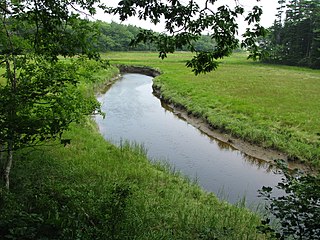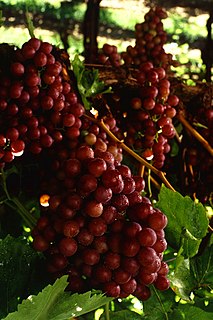
Asterales is an order of dicotyledonous flowering plants that includes the large family Asteraceae known for composite flowers made of florets, and ten families related to the Asteraceae.

The Xerces blue is an extinct species of butterfly in the gossamer-winged butterfly family, Lycaenidae. The species lived in coastal sand dunes of the Sunset District of San Francisco peninsula. The Xerces blue is believed to be the first American butterfly species to become extinct as a result of loss of habitat caused by urban development. The last Xerces blue was seen in 1941 or 1943 on land that is part of Golden Gate National Recreation Area.
St. Pepin is a modern hybrid variety of wine grape, mostly grown in North America. It produces grapes suitable for making fruity white wines similar to Riesling or as a base for blended wines. The grapes also make a good seeded table grape for eating. It has the benefits of early ripening and when hardened properly in the fall it is winter hardy to at least −25 °F (−32 °C). As such, it best suited to growing in more northern climates.

A tidal marsh is a marsh found along rivers, coasts and estuaries which floods and drains by the tidal movement of the adjacent estuary, sea or ocean. Tidal marshes experience many overlapping persistent cycles, including diurnal and semi-diurnal tides, day-night temperature fluctuations, spring-neap tides, seasonal vegetation growth and decay, upland runoff, decadal climate variations, and centennial to millennial trends in sea level and climate. They are also impacted by transient disturbances such as hurricanes, floods, storms, and upland fires.
The UC Davis College of Engineering is one of four undergraduate colleges on the campus of the University of California, Davis. One of the largest engineering programs in the U.S., the UC Davis College of Engineering offers 11 ABET-accredited undergraduate engineering majors. The college offers majors from a broad scope of engineering disciplines, including aerospace science, biochemical, biological systems, biomedical, chemical, civil, computer science, electrical, materials science, and mechanical engineering.

Hippodamia convergens, commonly known as the convergent lady beetle, is one of the most common lady beetles in North America and is found throughout the continent. Aphids form their main diet and they are used for the biological control of these pests.
Mesocriconema xenoplax is a species of plant parasitic nematodes. Nematodes of this particular species are collectively called ring nematodes.

Peter Gavin Hall was an Australian researcher in probability theory and mathematical statistics. The American Statistical Association described him as one of the most influential and prolific theoretical statisticians in the history of the field. The School of Mathematics and Statistics Building at The University of Melbourne was renamed the Peter Hall building in his honour on 9 December 2016.
Charles R. Berger was an American professor emeritus of communication at the University of California, Davis. Berger died on September 25, 2018, from health complications arising from cancer.

The Leslie Salt Company was a salt-producing company located in the San Francisco Bay Area, at the current locations of Newark, Hayward and other parts of the bay. They produced salt using salt evaporation ponds on the shores of the San Francisco Bay. By the 1940s, Leslie Salt under the dominant ownership of the Schilling family had become the largest private land owner in the Bay Area. By 1959, they were producing more than one million tons of salt annually, on over 26,000 acres of bay salt ponds. They were purchased by Cargill in 1978.
Gurdev Singh Khush is an agronomist and geneticist who, along with mentor Henry Beachell, received the 1996 World Food Prize for his achievements in enlarging and improving the global supply of rice during a time of exponential population growth.

The Flame Seedless is a vigorous, heavy-bearing table grape cultivar that keeps well in storage. It is a hybrid of Thompson Seedless, Cardinal, and several other Vitis vinifera cultivars. It produces large clusters of medium-large red grapes with a sweet flavor.
Johanna Schmitt is an evolutionary ecologist and plant geneticist. Her research is notable for its focus on the genetic basis of traits in ecologically valuable plants and on predicting how such plants will respond and adapt to environmental change such as climate warming. She has authored over 100 articles and her works have been cited over 7900 citations. She is honored with being the first female scientist at Brown University to be elected to the National Academy of Sciences.
Charles S. Fadley is an American physicist currently Distinguished Professor Emeritus at University of California, Davis and is an Elected Fellow of the American Association for the Advancement of Science, American Vacuum Society and Institute of Physics.
John Lescroart established the Maurice Prize in Fiction, which has been awarded annually since 2005. The prize is hosted jointly by John and the University of California, Davis English Department. The $5,000 prize is a gift from John in honor of his father, Maurice, for whom the contest is named.
J. Paul Leigh is an American economist and professor of health economics in the Department of Public Health Sciences at the University of California, Davis. He is also a member of the Center for Healthcare Policy and Research's core faculty there. He is known for his research in the fields of health economics, labor economics, and econometrics. For instance, he has studied the costs of occupational injuries.
Population biology is an interdisciplinary field combining the areas of ecology and evolutionary biology. Population biology draws on tools from mathematics, statistics, genomics, genetics, and systematics. Population biologists study allele frequency changes (evolution) within populations of the same species, and interactions between populations of different species (ecology).
Whendee Silver is an American ecosystem ecologist and biochemist.
Susan Patricia Harrison is a professor of ecology at the University of California, Davis who works on the dynamics of natural populations and ecological diversity. She is a fellow of the Ecological Society of America and the California Academy of Sciences. She has previously served as vice president of the American Society of Naturalists. She was elected to the National Academy of Sciences in 2018.







